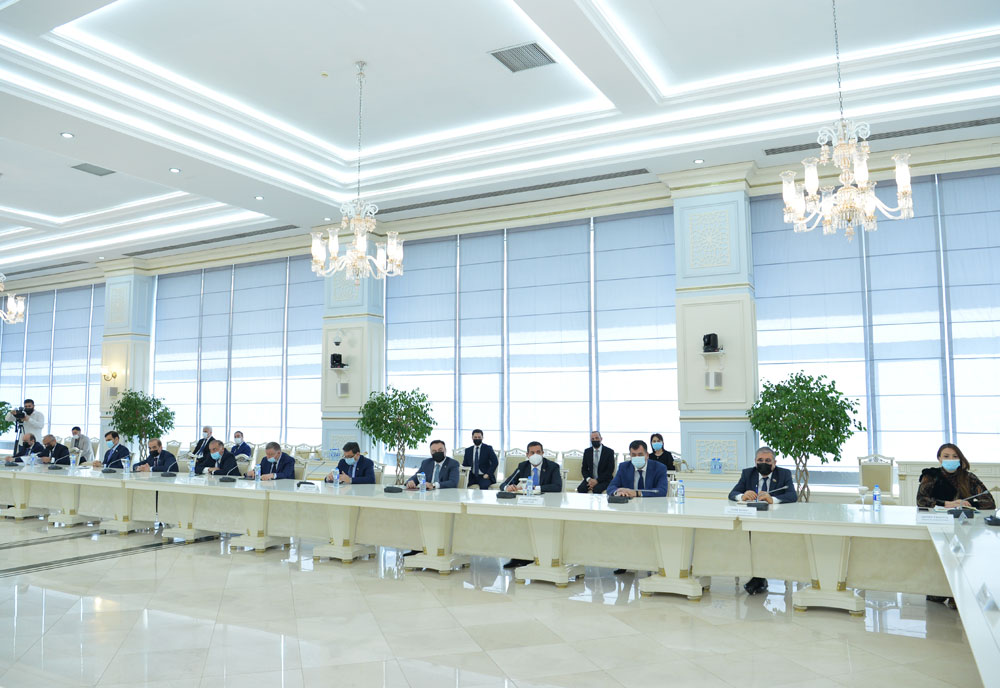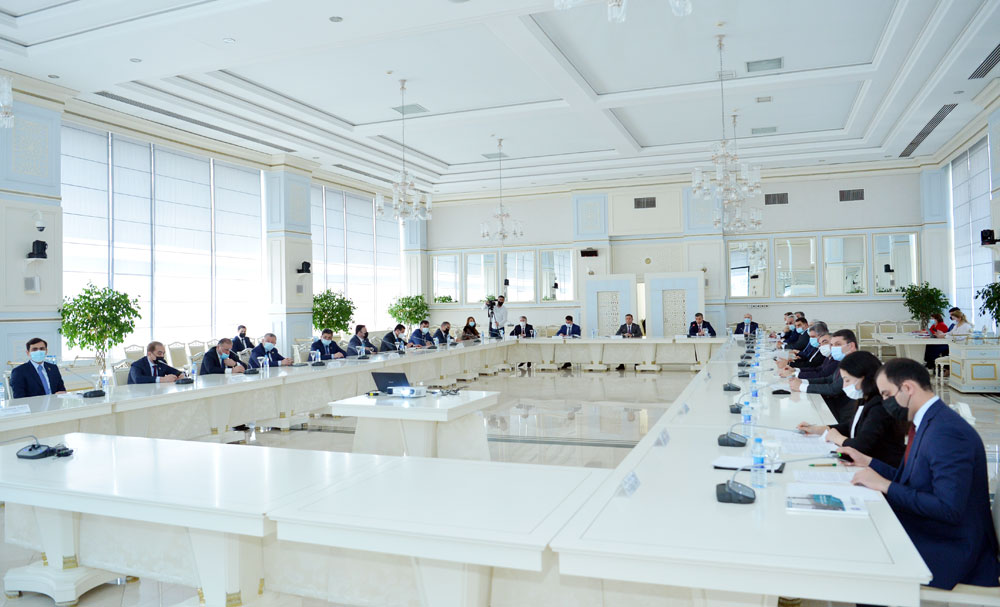Annual Report by Chamber of Accounts was heard by Milli Majlis Economic Policy, Industries and Enterprising Committee

Four items were considered at the meeting that the Milli Majlis Committee for Economic Policy, Industries and Enterprising held on 8 April.
The Bills on the agenda of the meeting were reviewed first. It was specified that the following draft amendments were technical in nature:
To the Forest, Labour, Family, Criminal, Tax, Criminal Procedure and Administrative Offences codes;
To the laws ‘On the Status of the military personnel’, ‘On Indexing the Monetary Incomes and Deposits of the Citizens of the Azerbaijan Republic’, ‘On the Sanitary-Epidemiological Well-Being’, ‘On the status and Social Protection of the Chernobyl Disaster Liquidators with Damaged Health’, ‘On the Protection of the Population’s Health’ and ‘On the Service and Civilian Arms’;
To the Garrison and Guard Service Charter of the Armed Forces of the Azerbaijan Republic (the Law No 886 dated 23 September 1994), the Internal Service Charter of the Armed Forces of the Azerbaijan Republic (the Law No 887 dated 27 September 1994), the Military Service Performance Regulation (the Law No 377-IQ dated 3 October 1997), the Provisions on the Special Documents of the Not Naturalised Permanent Residents of the Azerbaijan Republic (the Law No 421-IQ dated 30 December 1997), the Customs Authority Service Regulation (the Law No 768-IQ dated 7 December 1999) and the Regulations on the Commissions for Adolescents’ Cases and for the Protection of the Adolescents’ Rights (the Law No 336-IIQ dated 31 May 2002).
The Committee members suggested that all the three Bills should be tabled for consideration at a plenary sitting of the Milli Majlis.
Next, the Committee looked at the 2020 Progress Report by the Chamber of Accounts of the Azerbaijan Republic.
Chairman of the Economic Policy, Industries and Enterprising Committee Tahir Mirkishili mentioned that the annual report was not to be considered by one committee but be submitted for an open discussion at the suggestion of Chair of the Milli Majlis Sahiba Gafarova. The discussion was being broadened, set at higher standards and made open by the invitation to the meeting of six committee chairs, their deputies representing the Opposition and representatives of civic organisations.
According to Mr Mirkishili, efficiency and reinforcement of the state financial control as well as transparency and assiduity of public spending had a dramatic part to play in enhancing the national economic might, which, incidentally, is one of the cornerstone goals of the rapid economic reforms that the Head of the State is carrying into life. The State/Government had done an immense amount of work whilst the Milli Majlis had adjusted legislative acts in the past period for those goals to be achieved, Mr Mirkishili added. That the outcomes of the work done by the Chamber of Accounts are being laid before the MPs as well as the society in general are exceptionally important when it comes to making the forthcoming action more efficient and ensuring that yet more considered decisions are made from now on, according to Mr Mirkishili.
The 2020 Progress Report was tabled by the Chamber of Accounts Chairman Vugar Gulmammadov.
First, he made a point of telling the House that 2020 was a Victory Year: in it, our triumphant Army prevailed acting in accordance with the fine-tuned strategy of the Commander-in-Chief.
Going further, Mr Gulmammadov presented the MPs with the statistics connected with the COVID-19 pandemic that raged all over the globe last year, adding that the planned control measures had dropped in number by 25 per cent in the period in which remote operation was given preference to. Nonetheless, the Chamber was able to do its legally-prescribed work in a timely and prompt manner. Its opinion statements about the drafts of the State Budget, the spending and revenue projections of the off-budget state funds, the budgetary planning amendments and the performance of the State Budget were drawn up and submitted for consideration of the MPs within tight timeframes. Those statements contained recommendations concerning public asset administration, improvement and reinforcement of financial administration in general and attainment of higher reporting and transparency standards.
The state financial control measures implemented during the year incorporated 34 audits, 4 analytical inspections and 3 monitoring sessions. One of the audits was conducted in the manner dictated by the State Secret Law. One of the audits was concerned with revenues and the 33 with expenditures. An audit was undertaken in Lankaran; the remaining audits had to do with the inspected organisations active in Baku. The monitoring jobs were carried out in the Agjabedi, Agdam, Terter, Barda, Shamkir, Goranboy, Agsu and Hajikabul provinces.
The last-year control measures were mainly preoccupied with the agrarian sector, state procurement, financial reporting checks, budget planning and execution and the reporting by the SSPF.
Mr Gulmammadov told the House of the factors reducing the efficiency of the state support extended to the agrarian sector and cited the shortfalls in state procurement. He added that only a quarter of the manufacturers who had applied for subsidies had been issued with the land ownership statements and that 33.7 per cent of the total farmland had been left outside the state promotion. Besides, there was a notable shortage of specialist accounting staff coupled with the qualified specialist drain to the private sector.
The audit forms incepted subject to the new law enacted in 2018 were put to use in the reporting year during which the Chamber conducted 4 financial audits, 1 performance audit and 29 compliance audits. The use of information technologies in those audits was more extensive than in the years before.
The revealed misrepresented amounts added up to AZN 412.4 mn. The sum detected as resulting from deviations from the accountancy principles and erroneous accountancy entries equalled AZN 335.4 mn. The 34 audits undertaken last year revealed shortcomings in 452 cases; the operations worth AZN 130.3 mn in the aggregate were carried out in breach of the legal acts applicable to the specified error classification.
The work of the Chamber of Accounts scored 89 in the international Budget Openness Index released in 2020. This is the third best mark amongst the 117 countries rated last year.
At the end of his report, Mr Gulmammadov told the Parliament of the tasks earmarked for 2021.
The deliberations followed.
First Deputy Chair of the Milli Majlis and chairman of the Law Policy and State-Building Committee Ali Huseynov was the first to speak. The subsequent speakers – the committee chairs Musa Guliyev, Ganira Pashayeva, Sadig Gurbanov, Ziyafet Askarov and Tahir Rzayev, the deputy committee chairmen Ali Masimli, Gudrat Hasanguliyev and Asim Mollazade and the MPs Mahir Abbaszade, Vugar Bayramov, Elnur Allahverdiyev, Aydin Huseynov and Mazahir Efendiyev complimented the annual report by the Chamber and made certain suggestions. The co-ordinator of the Open Government Promotion Platform Alimammad Nuriyev lauded both the discussion format and the document in question and, too, put forth some suggestions of his own.
Deputy Chairman of the Chamber Nasir Sadigov and Head of the Chamber’s Legal Support and HR Department Nurana Safarova delivered reports on the subjects pertaining to the innovations in use in the Chamber of interest to the MPs. To cap it, Mr Gulmammadov answered MPs’ questions.
All the three presentations by the Chamber of Accounts were accompanied with colour slides and diagrams.
In the end, it was recommended that the 2020 Progress Report by the Chamber of Accounts of the Azerbaijan Republic should be tabled for consideration at a Milli Majlis plenary sitting.
The Press and Public Relations Department
The Milli Majlis







